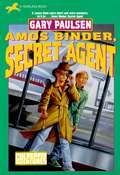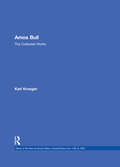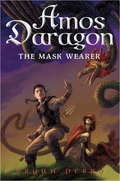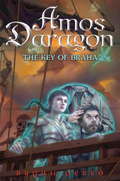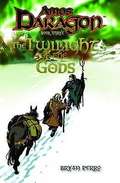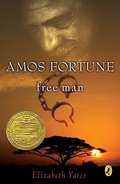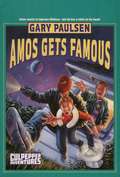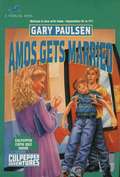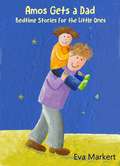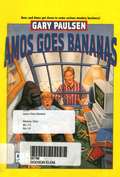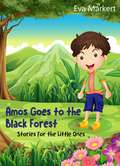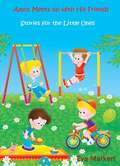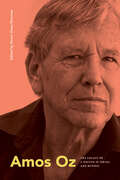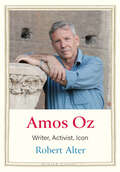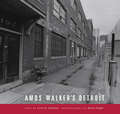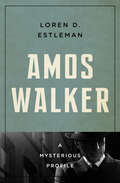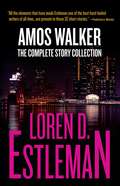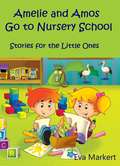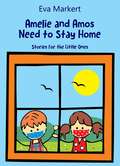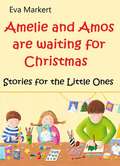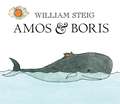- Table View
- List View
Amos Binder, Secret Agent (Culpepper #28)
by Gary PaulsenIt's spy vs. spy when Amos is mistaken for a government double agent and given a top secret assignment to fulfill. He's got the trench coat, the dark sunglasses, and that debonair James Bond way about him. Now all he needs is Dunc to bail him out!
Amos Bull: The Collected Works (Music of the New American Nation: Sacred Music from 1780 to 1820)
by Karl KroegerFirst Published in 1996. Routledge is an imprint of Taylor & Francis, an informa company.
Amos Daragon #1: The Mask Wearer
by Y. Maudet Bryan PerroAmos Daragon's life changes forever the day a mermaid gives him a mask capable of harnessing the strength of the wind-and appoints Amos as the new Mask Wearer. His task: to find the masks for the other elements, earth, fire, and water. Only then will Amos be fully empowered to battle the evil forces that threaten to destroy the balance of nature and plunge the world into darkness. To fulfill his destiny, Amos must make his way to the mysterious woods of Tarkasis. But a wicked sorcerer is terrorizing the land, searching for a skull pendant that was stolen from him-a pendant that conceals a secret weapon. What will Amos do when the pendant falls into his hands? Will Beorf, a boy who can morph into a bear, and Medusa, a snake-haired gorgon, turn out to be friend or foe? And will Amos master any of his newfound skills as Mask Wearer in time to face a formidable enemy? His chanllenges are great . . . and they're just beginning. From the Hardcover edition.
Amos Daragon #2: The Key of Braha
by Bryan PerroAmos survived his first mission as Mask Wearer, but soon after that, an encounter with a mysterious girl brings his life to an end--and sends him on his way to Braha, the City of the Dead, where souls await judgment. To get there, Amos, now a spirit himself, boards a boat, on which he meets Jerik, a decapitated criminal who must carry his head everywhere. Jerik tells Amos that Braha is overcrowded with spirits; the gods have shut the doors that lead to paradise and to hell. A key is said to unlock the doors--but its whereabouts are unknown. Only someone who dies and comes back to life can find it. Will Amos be that someone? Will his ingenuity and intelligence be enough to restore order in Braha? Or will he unknowingly serve those who are using him for their own gain? Most importantly, even if Amos finds the key, will he ever return to the land of the living?From the Hardcover edition.
Amos Daragon #3: The Twilight of the Gods
by Bryan PerroAmos Daragon is an ordinary boy with an extraordinary gift - he has been chosen to be the 'Mask Wearer'. Join him and his friends Behorf and Medusa as they overcome the forces of evil and harness the awesome powers of wind, earth, fire and water.
Amos Decker Series 4 Books Collection Set: Memory Man, The Last Mile, The Fix And The Fallen
by David BaldacciMemory Man: Amos Decker's life changed forever--twice. The first time was on the gridiron. A big, towering athlete, he was the only person from his hometown of Burlington ever to play in the NFL. But his career ended before it had a chance to begin. On his very first play, a violent helmet-to-helmet collision knocked him off the field forever, and left him with an improbable side effect--he can forget nothing. The second time was at home nearly two decades later. Now a police detective, Decker returned from a stakeout one evening and entered a nightmare--his wife, young daughter, and brother-in-law had been murdered. His family destroyed, their killer's identity as mysterious as the motive behind the crime, and unable to forget a single detail from that horrible night, Decker finds his world collapsing around him. He leaves the police force, loses his home, and winds up on the street, taking piecemeal jobs as a private investigator when he can. But over a year later, a man turns himself in to the police and confesses to the murders. At the same time a horrific event nearly brings Burlington to its knees, and Decker is called back in to help with this investigation. Decker also seizes his chance to learn what really happened to his family that night. To uncover the stunning truth, he must use his remarkable gifts and confront the burdens that go along with them. He must endure the memories he would much rather forget. And he may have to make the ultimate sacrifice. The Last Mile: Convicted murderer Melvin Mars is counting down the last hours before his execution--for the violent killing of his parents twenty years earlier--when he's granted an unexpected reprieve. Another man has confessed to the crime. Amos Decker, newly hired on an FBI special task force, takes an interest in Mars's case after discovering the striking similarities to his own life: Both men were talented football players with promising careers cut short by tragedy. Both men's families were brutally murdered. And in both cases, another suspect came forward, years after the killing, to confess to the crime. A suspect who may or may not have been telling the truth. The confession has the potential to make Melvin Mars--guilty or not--a free man. Who wants Mars out of prison? And why now? But when a member of Decker's team disappears, it becomes clear that something much larger--and more sinister--than just one convicted criminal's life hangs in the balance. Decker will need all of his extraordinary brainpower to stop an innocent man from being executed. The Fix: Amos Decker witnesses a murder just outside FBI headquarters. A man shoots a woman execution-style on a crowded sidewalk, then turns the gun on himself. Even with Decker's extraordinary powers of observation and deduction, the killing is baffling. Decker and his team can find absolutely no connection between the shooter -- a family man with a successful consulting business -- and his victim, a schoolteacher. Nor is there a hint of any possible motive for the attack. Enter Harper Brown. An agent of the Defense Intelligence Agency, she orders Decker to back off the case. The murder is part of an open DIA investigation, one so classified that Decker and his team aren't cleared for it. But they learn that the DIA believes solving the murder is now a matter of urgent national security. Critical information may have been leaked to a hostile government -- or worse, an international terrorist group -- and an attack may be imminent. Decker's never been one to follow the rules, especially with the stakes so high. Forced into an uneasy alliance with Agent Brown, Decker remains laser focused on only one goal: solving the case before it's too late. The Fallen: Star FBI detective Amos Decker and his colleague Alex Jamison must solve four increasingly bizarre murders in a dying rust belt town--and the closer they come to the truth, the deadlier it gets in this rapid-fire #1 New York Times bestseller. Something sinister is going on in Baronville. The rust belt town has seen four bizarre murders in the space of tw...
Amos Fortune: Free Man
by Elizabeth YatesWinner of the Newbery Medal!<P><P> When Amos Fortune was only fifteen years old, he was captured by slave traders and brought to Massachusetts, where he was sold at auction. Although his freedom had been taken, Amos never lost his dignity and courage. For 45 years, Amos worked as a slave and dreamed of freedom. And, at age 60, he finally began to see those dreams come true.
Amos Gets Famous (Culpepper Adventures)
by Gary PaulsenDeciphering a code they find in a library book, best friends for life Amos and Dunc stumble onto a burglary ring. The burglars' next target is the home of Melissa, the girl of Amos's dreams (who doesn't even know that he's alive). Amos longs to be a hero to Melissa, so nothing will stop him from solving this case--not even a mind-boggling collision with a jock, a chimpanzee, and a toilet.
Amos Gets Married (Culpepper Adventures)
by Gary PaulsenAfter Amos accidentally knocks Melissa out, she suddenly seems to really like him, so Amos' best friend Dunc decides to figure out why she is acting so strangely and why things are mysteriously disappearing at school.
Amos Gets a Dad: Bedtime Stories for the Little Ones
by Eva MarkertAmos's mum has married the nice Mr Baldwin and calls him Henry. Amos doesn't know what he should call him, so he sticks with "Mr Baldwin" for a start. Amos has loads of fun with him. Mr Baldwin has a talking budgie and the longest handkerchief in the world. He takes Amos to bed every night and tickles him until he's had enough or he thinks up funny stories with him. And he is always there when Amos needs help. Amos therefore realises one day that Mr Baldwin is not just Mr Baldwin, but his dad, and indeed the best dad in the whole world!
Amos Goes Bananas (Culpepper Adventures)
by Gary PaulsenAmos has more than a monkey on his back. It's a gorilla. Her name is Louise. And she's in love. Culpepper Adventures #24
Amos Goes to the Black Forest: Stories for the Little Ones
by Eva MarkertAmos would actually rather go to the sea with his parents, but he also enjoys being in the Black Forest. There, people can go on unusual walks, play adventure mini golf, meet bears and wolves, or even go sledging in the summertime! And there are two more special reasons why Amos will never forget this holiday in the Black Forest. Fifteen stories for the little ones
Amos Has to Go to Bed
by Eva Markert<p>"Good night sweet dreams," says Amos's Mum every night. Amos usually stays awake for a while though. It's never boring in bed. Not with a troll in his room, a teepee in the corner, a scary moth on his wall and a dreamcatcher over his bed. </p>
Amos Meets up with His Friends: Stories for the Little Ones
by Eva MarkertAmos likes to meet up with his friends to play and run around all afternoon. They watch exciting films at the cinema, marvel at the acrobats in the circus, visit the Punch and Judy show, ride the big wheel at the fair, and celebrate birthdays together. Amos always has fun, even though things don't always go according to plan.
Amos Oz: The Legacy of a Writer in Israel and Beyond (SUNY series in Contemporary Jewish Literature and Culture)
by Ranen Omer-ShermanThe veteran contributors to this volume take as their central drama, and their essential task for analysis, the enduring literary and political legacy of Israel Prize laureate Amos Oz (1939–2019). Born a decade prior to the establishment of the state of Israel, in what was then Palestine under British rule, Oz's life spanned the country's entire history, and both his fiction and nonfiction restlessly probe and illuminate its fraught conflicts, contradictions, and ambivalences. Throughout his career, Oz grappled frankly with the often-painful realities of Israeli life while also celebrating the ebullience of the Israeli spirit, and his sophisticated understanding of the sociopolitical turmoil of his society was always accompanied by intensely lyrical language and deep penetrations into the vulnerabilities of the human psyche. The volume's twenty contributors bring an exciting diversity of concerns and perspectives to Oz's most celebrated novels (including his powerfully resonant final novel, Judas) as well as to overlooked facets of his oeuvre, illuminating the breathtaking scope of his literary legacy. Together, they offer gripping analyses of his urgent and profoundly universal works about political and romantic dreamers whose heartfelt struggles with both their own human frailties and those of the state ultimately resonate far beyond Israel itself.
Amos Oz: Writer, Activist, Icon (Jewish Lives)
by Robert AlterAn intimate portrait illuminating the life and work of Amos Oz, the award-winning Israeli writer and activist Amos Oz (1939–2018) was one of Israel&’s most prolific and prominent writers, as well as a regular contender for the Nobel Prize for Literature. He was the author of dozens of novels, essay collections, and novellas written between 1965 and shortly before his death. In this first published biography of Oz, the celebrated translator, literary critic, and biblical scholar Robert Alter explores Oz&’s relationship with his family, beginning with the suicide of his mother, Fania Klausner, when he was twelve years old, and goes on to review his time in Kibbutz Hulda, which he entered at fourteen following his separation from his father, Arieh Klausner; his family&’s right-wing Zionism; his writing career; his activism in support of a pluralistic Israel; and his work as an international lecturer. In examining Oz&’s life and work, Alter brings together testimony from Oz and his circle, as well as close readings of his central works, to present the inner world and public persona of Amos Oz.
Amos Walker's Detroit: Amos Walker's Detroit
by Loren D. Estleman Monte NaglerA photographic tour of famous and infamous Detroit-area locations from Loren D. Estleman's popular Amos Walker series of detective novels.
Amos Walker: A Mysterious Profile (Mysterious Profiles)
by Loren D. EstlemanThe four-time Shamus Award–winning author takes his readers behind-the-scenes of his long running detective series. In 1980, readers first encountered hard-boiled private detective Amos Walker as he searches for an ex-mobster&’s missing daughter in Motor City Blue. Many mysteries and decades later, the investigator is still scuffling with bad guys on the streets of Detroit. But when and where did award-winning author Loren D. Estleman conceive the idea of Walker and his adventures? In this essay, Estleman tells the story of how Walker and his world transpired. From the 1975 film that inspired the character to Walker&’s weapons and cars, Estleman offers fans a look into his process of fleshing out Walker as a complex character with friends and enemies. Learn how television influenced him as a writer and how he chose Walker&’s name, hometown, and background. Fans looking to get to know their favorite tough-guy detective better won&’t want to miss this . . . Praise for Loren D. Estleman and the Amos Walker series &“A touchstone for fans of hard-boiled crime fiction: irrepressible tough-guy dialogue, great plotting, a vibrant Detroit milieu, and a hero who has whiskey on his breath and nicotine stains on his fingers.&” —Booklist &“For readers who can&’t get enough of Elmore Leonard and Ross Thomas, try Estleman. He&’s that good.&” —People &“Estleman&’s latest intricate and wholly enjoyable yarn is peppered with mob lore, Detroit history, and the ever-present one-liners. It&’s sure to please fans of urban mysteries as well as classic detective genre devotees. Strongly recommended.&” ―Library Journal &“Amos Walker, the throwback private eye who operates out of Detroit in Loren D. Estleman&’s hard-boiled mysteries, is a lot like the old Cutlass he drives. The guy may look beat up, but under the hood he's a clean machine.&” ―The New York Times Book Review
Amos Walker: The Complete Story Collection
by Loren D EstlemanThis anthology collects all thirty-two previously published Amos Walker stories, a previously unpublished story written for the collection, and an introduction by Mr. Estleman.
Amos Walker: The Complete Story Collection
by Loren D. EstlemanThirty years ago Loren D. Estleman introduced the world to his Detroit detective Amos Walker. In celebration of this anniversary, Estleman has collected every previously published Walker short story in this massive volume, including a brand-new story never before published! An authority on both criminal history and the American West,Loren D. Estlemanhas been called the most critically acclaimed author of his generation. He has been nominated for the National Book Award and the Mystery Writers of America Edgar Allan Poe Award.
Amos Walker: The Complete Story Collection
by Loren D. EstlemanThis anthology collects all thirty-two previously published Amos Walker stories, a previously unpublished story written for the collection, and an introduction by Mr. Estleman.
Amos and Amelie Go to Nursery School: Stories for the Little Ones
by Eva MarkertAmelie and Amos like going to nursery school. Amos makes the crybaby Anya laugh and saves Alex when he disappears during a trip to the forest. Toby is annoyed because Amos’ hamster has the same name as him. Amelie has to work hard to get a carrot down during a healthy breakfast and helps the Syrian girl Banu learn German. It never gets boring in nursery school!
Amos and Amelie Need to Stay Home: Stories for the Little Ones
by Eva MarkertA dangerous virus is making many people sick. Because of this, nothing is as it was. Most of the businesses are closed. In those that are still open, there isn’t enough of everything available to buy. Schools, preschools and playgrounds are also closing, and so Amelie and Amos need to spend almost all day at home. Even though it is a difficult time for many, there are wonderful experiences as well. And one thing is certain: Eventually, things will be looking up again!
Amos and Amelie are Waiting for Christmas: Stories for the Little Ones
by Eva MarkertDecember is here! For Amelie and her cousin Amos, it is a time of anticipation. The first snow is falling, candles are being lit and cookies being baked, the whole house is decorated for Christmas. St. Nicholas is coming and they have to finish their wish lists in time. But not everything always goes smoothly...
Amos and Boris
by William SteigAmos the mouse and Boris the whale: a devoted pair of friends with nothing at all in common, except good hearts and a willingness to help their fellow mammal. They meet after Amos sets out to sail the sea and finds himself in extreme need of rescue. And there will come a day, long after Boris has gone back to a life at sea and Amos has gone back to life on dry land, when the tiny mouse must find a way to rescue the great whale. <P><P>[This text is listed as an example that meets Common Core Standards in English language arts for grades 2-3 at http://www.corestandards.org.]
